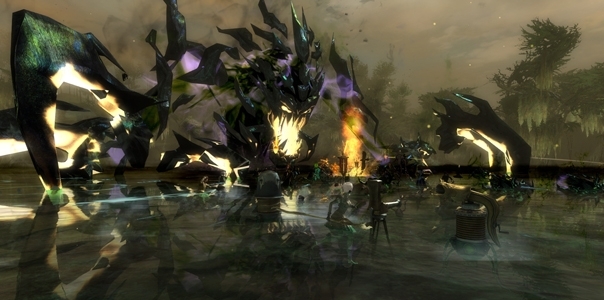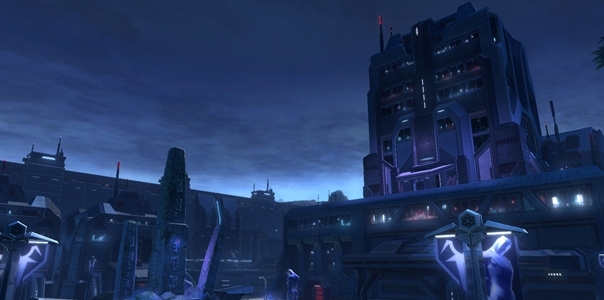Game Mechanics: Questing
In a new regular feature, Gareth Harmer digs into the most-abused mechanic afflicting modern MMOs.

The Different Path
This isn’t just a problem that plagues MMOs; questing can be found in many single-player RPGs. From Master Chief to Mass Effect, games rely on encouraging us through the narrative, usually interspersing frantic action with plot-moving cut scenes. The key to it all is striking a balance, allowing the player to enjoy the moment-to-moment action, while maintaining that sense of progression. It’s also partly why quick-time-events are loathed in action games – they became a narrative crutch that hideously jarred player immersion.
There’s also an element of subtlety at play. Torchlight 2 makes a point of using quests very sparingly, either by encouraging adventure into deep ruins or heading out from one location to another; it refuses to get in the way of that famed hack-and-slash adventure combat. The classic Bioshock used it to brilliant effect (and if you haven’t played it, would you kindly get a copy?), hiding quests in plain sight and masterfully orchestrating a superb ending as a result. It’s this kind of refined gameplay that has barely made it into MMOs, instead relying on repeating the same tired methods.
It’s taken Guild Wars 2 to really grab the problem by the horns and show the rest of the MMO industry what mechanical innovation actually looks like. Even then, it’s still a variation on a theme, like listening to a Staccato in Prehistoric Game Mechanics. Instead of breadcrumb quests, Scout NPCs direct us to where the quests are. Instead of hubs of quest givers, a Renown Heart NPC gives us a list of things we can do to fill up a progress bar. Those things are usually back to the classics: killing stuff, fetching stuff, or running around like a loon and interacting with stuff.
The difference is that the experience is much more tolerant of many players being in the same area, working in concert even if they don’t realize it. Spontaneous events are the same – anyone can take part and get rewarded for doing so. The original elements are still there if you look for them, but it’s like gazing through a bathroom window.
But there’s a catch: whatever we think of quests, when done well they’re much better at delivering narrative than the Guild Wars 2 Renown Heart system. In the hands of a storytelling master, and used with a compelling plotline, they can be used to tell stories that we talk about for years. Even EVE acknowledges this – their sandbox is great for helping the players tell their own stories, but is terrible for helping to set the scene about the virtual world. There’s not enough narrative jigsaw to help newcomers piece together their own story.
Quests are also great as a tutorial on how to play the game. You drip feed in abilities slowly and help newcomers to understand how your game works. Just throwing the door to the big bad world open and saying “here you go; do stuff!” is going to leave everyone bewildered who hasn’t played Minecraft.

Breaking the Mesh
It’s hard to acknowledge that one of the basic building blocks of MMO gaming can become boring without a masterful plot team that regularly kicks ass, or combat that’s deeply engrossing no matter what class you choose. That’s a huge responsibility shunt. But it also might be why so many MMOs experiment with mechanics like abilities, skill trees, classes and so on. It’s easier to come up with ten ways to replace a peripheral system, than it is to change one fundamental mechanic.
A story needs to be told, but it doesn’t need to be narrated and signposted every step of the way. Kick off those training wheels and find better ways for players to explore and experiment in the world. That doesn’t have to mean incorporating huge amounts of player freedom – it could be something as simple as making one quest last an entire zone.
Players also deserve to have some control over their own stories and creating their own adventures. Boasting about how you killed the boss of a gang of thieves means little when everyone else had exactly the same experience (or even worse, tell you how you did it wrong, and how their method was infinitely more optimal). Providing a safe and streamlined experience is tempting as heck, but it’s starting to get claustrophobic for anyone who’s been playing the genre for more than a few years.
Besides, we constantly demand more content. If we’re stuck doing the same old thing all the time, we get bored and we quit. Developers can’t keep up the pace either – it’s impossible to churn out good quality content every month to keep up with our insatiable appetites.
It’s time we also had a good, hard look at decoupling questing from character reward and progression systems. After all, how many times have you pulled an epic greatsword from a crocolisk, or discovered that tree spiders love eating gold coins? It also pushes back the emphasis onto core gameplay: in Planetside 2, I’m not butchering the Terran Republic in order to earn certs and buy better weapons; I’m doing it because it’s fun, and everything else just happens to fall in to my lap.
So here’s a thing. Figure out a way to bring back multiplayer nudges into the younger game. Don’t force story on us all the time, but instead make those storied moments something truly special. Reward us for playing the game, not doing inane tasks. And make those rewards meaningful – trinkets that remind us of our early adventures, blades that are really the hallmark of a nation’s gratitude.
The game should be its own reward. The beauty and mystery of it should be what we take away. The memories of our epic adventures should be our treasure. Not some polygonal cubic zirconia that we’re going to vendor as soon as possible. Not some progress up an arbitrary meter toward arbitrary goals.
And please, for the love of cogs, no more requests to kill ten rats. I’m a damned hero. Piss off.
Gareth “Gazimoff” Harmer, Senior Contributing Editor